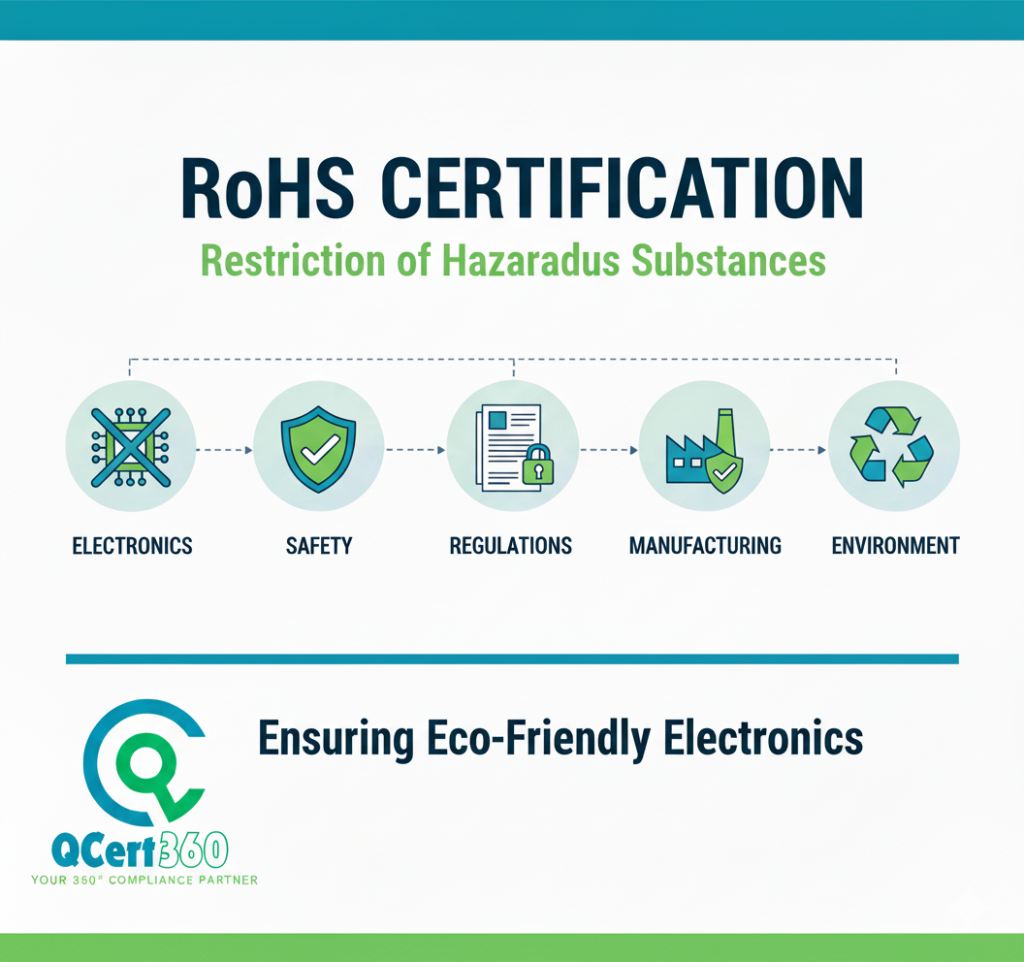RoHS Certification
ChatGPT said:
RoHS Certification (Restriction of Hazardous Substances) is a compliance requirement that restricts the use of specific hazardous materials in electrical and electronic equipment. Originating in the European Union, it limits substances like lead, mercury, cadmium, hexavalent chromium, and certain flame retardants. The goal is to reduce environmental impact, ensure safe recycling, and protect human health. RoHS applies to manufacturers, importers, and distributors of electronic products sold in EU markets. Achieving RoHS certification demonstrates a company’s commitment to sustainability, regulatory compliance, and product safety. It also enhances global market access, as many countries have adopted similar environmental protection requirements.
Request a Call Back
Get Free Consultation
Have any Questions?
Mail us Today!
contact@qcert360.com
RoHS Certification – Ensuring Environmental and Consumer Safety
For businesses manufacturing or selling electronic and electrical products, compliance with RoHS requirements is essential. The RoHS directive (Restriction of Hazardous Substances) limits the use of certain dangerous materials in electronic products. Achieving RoHS certification is not just about meeting regulations—it’s about protecting consumer health, ensuring environmental sustainability, and building global market trust.
What is RoHS Certification?
RoHS Certification is a mandatory compliance requirement in the European Union (and adopted in many other regions) that restricts the use of hazardous substances such as lead, cadmium, mercury, hexavalent chromium, and certain flame retardants in electrical and electronic equipment.
This certification applies across industries including consumer electronics, household appliances, medical devices, lighting, IT equipment, and industrial machinery. By achieving RoHS compliance, manufacturers not only meet regulatory requirements but also demonstrate a commitment to safety, sustainability, and product reliability.
Why RoHS Certification Matters for your product
RoHS certification is more than a regulatory checkbox—it has become a business differentiator in global markets. By complying, companies not only meet legal requirements but also position themselves as responsible and forward-looking manufacturers. Here’s why it matters:
Market Access – RoHS compliance is mandatory for selling electronic and electrical products in the EU and many other regions adopting similar regulations. Without it, market entry is impossible.
Consumer Safety – By eliminating hazardous substances like lead, cadmium, and mercury, RoHS reduces health risks for consumers who use these products daily.
Environmental Protection – RoHS plays a vital role in minimizing e-waste toxicity, ensuring safer recycling, and supporting a circular economy.
Business Competitiveness – Today’s buyers and distributors prefer working with eco-conscious suppliers. RoHS certification strengthens credibility and trust with environmentally aware partners.
Global Opportunities – With RoHS recognized across multiple international markets, certification simplifies exports and expands global trade opportunities.

Benefits:
Enhanced Marketability:
Obtaining certification boosts brand visibility and credibility, making products and services more attractive to consumers and increasing market share in global markets.
Consumer Trust & Satisfaction:
Certification assure customers of consistent quality, safety, and reliability, fostering trust, increasing brand loyalty, and ensuring higher levels of customer satisfaction.
Regulatory Compliance
Certification ensure compliance with global standards and regulations, helping businesses avoid legal issues, penalties, and enabling smoother entry into diverse international markets.
Competitive Advantage
Holding certification distinguishes a business from competitors, signaling superior quality and reliability, and positioning the company as an industry leader in the market.
Global Expansion
Certification provide access to new international markets, demonstrating that a business meets global standards, which facilitates expansion and opens doors to new business opportunities worldwide.
Risk Mitigation & Efficiency
Certifications help identify and mitigate risks, streamline operations, and reduce errors or defects, ensuring efficiency and consistency while safeguarding against operational disruptions.
Core Components of RoHS Certification
Achieving RoHS certification requires a structured approach to ensure that products meet the strict requirements of the directive. The process typically involves:
Product Classification – Determining whether a product or component falls under the scope of RoHS directives and identifying applicable exemptions if any.
Material Testing – Conducting accredited laboratory analysis to detect and measure restricted substances such as lead, cadmium, mercury, hexavalent chromium, and specific flame retardants.
Supplier Declarations – Gathering and validating compliance statements from suppliers, ensuring that every part of the supply chain aligns with RoHS standards.
Technical Documentation – Preparing comprehensive records, including testing reports, material declarations, and detailed evidence that products meet RoHS thresholds.
Conformity Assessment – Reviewing and verifying that all components, processes, and supplier inputs comply with RoHS limits and regulatory requirements.
Declaration of Conformity – A formal document issued by the manufacturer, confirming full compliance and enabling the product to be placed on the market.
Benefits of RoHS Certification for your product
Achieving RoHS compliance delivers more than regulatory approval—it creates long-term business value and trust across markets. Key benefits include:
Legal Authorization – Grants the right to sell electronic and electrical products in the EU and other regions that have adopted RoHS standards.
Risk Reduction – Minimizes the likelihood of costly product recalls, regulatory fines, or bans due to non-compliance.
Stronger Brand Reputation – Positions the company as a responsible and environmentally conscious manufacturer committed to consumer safety.
Buyer and Consumer Trust – Builds confidence among importers, distributors, and end-users who prioritize eco-friendly and compliant products.
Competitive Advantage – Enhances credibility in global supply chains, making your business more attractive in tenders and procurement processes.
Sustainability Contribution – Supports greener manufacturing practices by reducing hazardous waste and promoting responsible recycling.
By securing RoHS certification, organizations not only meet legal requirements but also strengthen their global reputation, expand market opportunities, and align with growing consumer demand for sustainable and safe products.
Who Needs RoHS Certification?
RoHS compliance is not optional—it’s a legal requirement for any business placing electrical or electronic equipment on regulated markets. Key stakeholders include:
Electronics Manufacturers – Producers of phones, laptops, tablets, household appliances, and IT devices must ensure their components are free from restricted substances.
Medical Device Producers – Makers of diagnostic equipment, monitoring tools, and electronic instruments need certification to safeguard patient safety and market access.
Lighting and LED Manufacturers – Bulbs, fixtures, and smart lighting systems fall under RoHS directives due to their widespread use and environmental impact.
Industrial Equipment Makers – Control panels, machinery, and automation systems must comply to maintain credibility in industrial supply chains.
Consumer Goods Producers – Toys, gadgets, and home electronics sold in the EU and other RoHS regions require certification to reach customers.
In essence, any organization that designs, manufactures, imports, or distributes electrical or electronic products in RoHS-regulated regions must achieve compliance to stay competitive and legally authorized.
Ongoing Compliance Under RoHS Certification
RoHS compliance is not a one-off achievement—it requires continuous effort and vigilance. To remain compliant, organizations must:
Monitor Regulatory Updates – Stay current with changes to RoHS directives, new restricted substances, and evolving global regulations.
Retest Materials and Components – Conduct fresh testing whenever suppliers, materials, or production processes change, ensuring consistency across the supply chain.
Maintain Technical Documentation – Keep compliance records, test reports, and supplier declarations updated and ready for inspections or audits at any time.
Perform Internal Audits – Regular audits help identify gaps, correct issues early, and strengthen overall compliance management.
Train Employees – Equip teams with knowledge on sustainable sourcing, material safety, and compliance processes to maintain accountability.
By treating RoHS as an ongoing responsibility rather than a one-time milestone, companies reinforce their commitment to safety, sustainability, and trust. This proactive approach safeguards market access, protects brand reputation, and builds lasting confidence with regulators, buyers, and customers.
Conclusion: How to get RoHS certification for your product
Achieving RoHS certification goes beyond ticking regulatory boxes—it requires technical expertise, meticulous documentation, and effective management of the entire supply chain. At Qcert360, we guide organizations through every step of the compliance journey. Our comprehensive services include supplier audits, material testing support, preparation and maintenance of compliance documentation, and full audit readiness to ensure a smooth certification process.
Partnering with Qcert360 means gaining more than just a certificate. We help businesses ensure their electronic and electrical products are safe, fully compliant, and environmentally responsible. With our support, your company can confidently access regulated global markets, strengthen its brand credibility, reduce risks of non-compliance, and demonstrate a commitment to sustainable manufacturing. By embedding RoHS principles into operations, organizations not only meet legal requirements but also build long-term trust with customers, partners, and regulators, paving the way for lasting business success.
Sectors & Industries we serve
Our Services
ISO Standards
- ISO 9001 Certification
- ISO 14001 Certification
- ISO 45001 Certification
- ISO 22000 Certification
- ISO 17025 Certification
- ISO 27001 Certification
- ISO 13485 Certification
- ISO 20000-1 Certification
- ISO 41001 Certification
- ISO 22716 Certification
- ISO 50001 Certification
- ISO 22301 Certification
- ISO 29993 Certification
Product Certifications
Other international standards
- FSSC 22000 Certification
- HIPAA
- HACCP Certification
- SA 8000 Certification
- GMP Certification
- GDPR
- GDP Certification
- GLP Certification
- Certificate of Conformity


